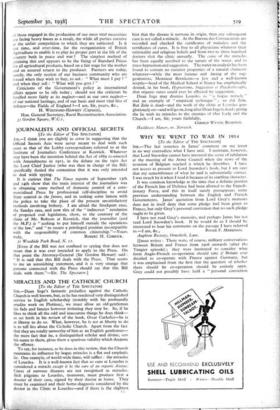JOURNALISTS AND OFFICIAL SECRETS (To the Editor of THE SPECTATOR]
SIR, —I think you are slightly in error in suggesting that the Official Secrets Acts were never meant to deal with such cases as that of the Lobby correspondents referred to at the Institute of Journalists Conference at Keswick. Whatever may have been the intention behind the Act of 1889 re-enacted with Amendments in 1911, in the debate on the 1920 Act the Lord Chief Justice (who was then in charge of the Bill) specifically denied the contention that it was only intended to deal with spying.
It is curious that The Times reports of September 13th and 14th show that the main interest of the journalists was in obtaining some method of domestic control of a com- mercialised Press by professional self-discipline to avoid State control in the future, and in seeking some liaison with the police to take the place of the present unsatisfactory methods involving bribery. I am afraid the Stockport case, the Sandys case, and now this of the " indiscreet " revelation of proposed coal legislation, show, to the contrary of the claim of Mr. Robson at Keswick, that the journalist (and the M.P.) is " seeking to put himself outside the operations of the law," and " to secure a privileged position incompatible with the responsibility of common citizenship."—Yours
31 Woodside Park Road, N. 52.
[Even if the Bill was not confined to spying that does not mean that it was ever intended to apply to the Press. On that point the Attorney-General (Sir Gordon Hewart) said :
It is said that this Bill deals with the Press. That seems to me an astonishing statement, and it is very strange that persons connected with the Press should say that this Bill deals with them."—ED. The Spectator.]














































 Previous page
Previous page